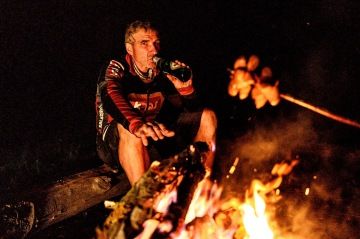food, drink and nutrition

An extreme race like Miles requires extremely high-quality nutrition in the form of a perfectly prepared nutritional program that dispenses precise doses of protein, carbohydrates, fats and fast sugars. All this washed down with nutritional, ionic and energy drinks...
That's a theory, the reality in Míly is completely different.
food
When planning a meal, a competitor must take into account several factors that are not obvious at first glance: 1) the competitor eats himself, with what he carries with him - which is a very limited amount of food in terms of volume and weight, 2) the competitor buys food in shops along the route, which are mostly modestly equipped Vietnamese stores or pumps with a very limited range of food, 3) The racer eats when he meets a pub where there is no time to choose much food and so he takes what is available.
The experience of most competitors is that the body will tell itself what it needs. So it sounds a bit unprofessional, but our advice is: listen to your body and eat what it wants.
drink
There is never enough fluid. This is the second race nutrition tip. Equip yourself with enough water bottles or a fluid bag. Even though the route leads through a landscape where you can always find a building //and you can here// where you can refill your water, there are times when this certainty can leave you on the edge of your seat. Examples include: extreme heat, night, a weekday when the furriers are not at the cottage, a weekend or public holiday when everything is closed.
nutrition supplements
There is not a competitor in the Miles who does not set out on the route stocked with energy bars, an ion pack, gels and other accessories. He mostly consumes them during the first days, and in the following days he is dependent on what he gets along the way - that is, nothing. The third piece of advice is: don't rely on special nutritional supplements, but rely on commonly available foods.